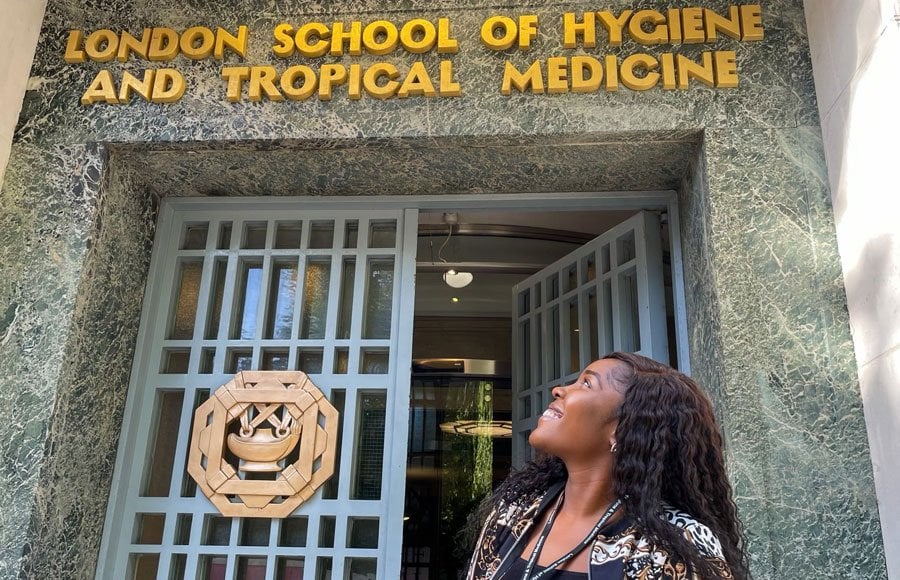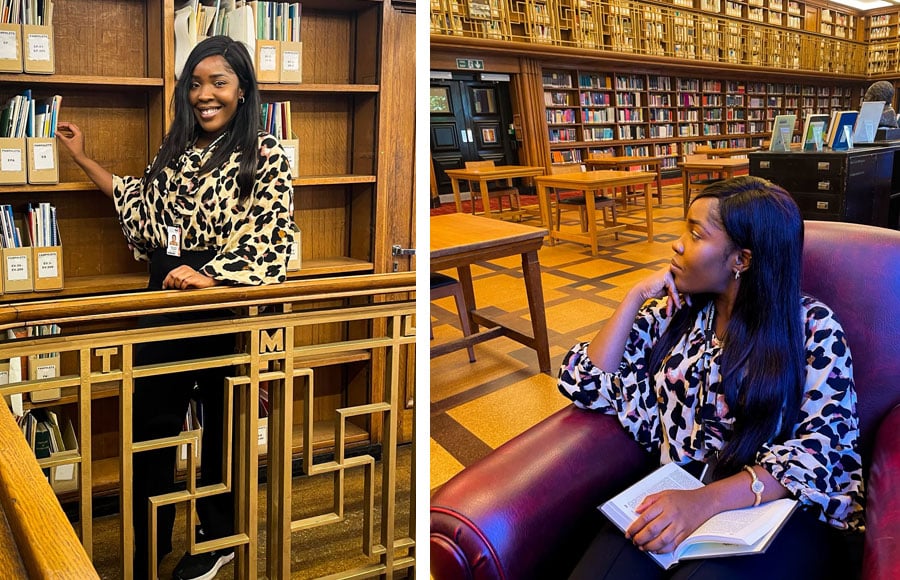The impact of scholarships
20 October 2022 London School of Hygiene & Tropical Medicine London School of Hygiene & Tropical Medicine https://lshtm.ac.uk/themes/custom/lshtm/images/lshtm-logo-black.png
Every year, LSHTM donors, alumni and friends donate to help widen access to education through the provision of scholarships. Scholarships are transformational, have the capacity to change the lives of the students who receive them, and alleviate the financial burden of study for talented and motivated recipients. This support ultimately offers them the freedom to focus wholly on realising their ambitions at LSHTM, which for many of our students means building the experience and expertise they need to become world leaders in their chosen field. Omolayo Anjorin is a scholarship recipient at LSHTM and a current face-to-face Master’s student in the MSc in Global Mental Health. The generous support Omolayo has received has inspired her to strive to achieve her potential and advance her career in healthcare by gaining the knowledge and skills she needs to maximise her impact on global health equity.
Tell us about yourself and your experiences. What were you doing before you came to LSHTM?
My name is Omolayo and I am currently studying for an MSc in Global Mental Health, a combined Master’s course at LSHTM and King’s College London. I spent most of my childhood in Nigeria, living with my very supportive family. I consider myself a highly motivated, hard-working, and passionate individual, who enjoys solving problems and loves working with people. I have demonstrable experience in clinical care, public health, psychosocial support, health consulting, and project management. My passion for healthcare provision has grown exponentially throughout my life, resulting in such endeavours as volunteering in refugee camps during the 2014 Donbas war in Ukraine.
Due to the disparities I noticed among people in my country, when I was 16, I was inspired to co-found a non-profit organisation that aims to address socioeconomic gaps in education and health, and also offer psychosocial support groups, free health services and entrepreneurial skills training for the local community. Over the past 12 years, we have collaborated with several local, national, and international organisations to deliver training in entrepreneurship, and provided health services to people from marginalised communities. I have also worked at the National Hospital Abuja and provided clinical care to patients which taught me about the inequities that exist in medicine. Following that, I served in an NGO; Solina Center for International Development and Research, and saw first-hand the value of addressing underlying determinants when seeking to optimise and sustain health outcomes. All of this led to expanding my career, to becoming a researcher.
After 5 years of experience working in a low- middle-income country (LMIC), battling infectious diseases and a rising incidence of chronic diseases, I came to realise that mental health illnesses, however prevalent, were overwhelmingly under-recognised at both individual and population levels. I became acutely aware of the complexity associated with quality mental healthcare delivery in LMICs. I understood the critical need for awareness as a precursor to elevating the importance of mental health and improving data systems for policymaking and healthcare funding.
I needed to expand my knowledge beyond the prescription of medication to individual patients and aim to revitalise the mental health system to implement sustainable health policies that will provide quality, emergency, and effective health care services to all Nigerians.
Through this once-in-a-lifetime opportunity, supported by scholarships, I know I will be empowered to contribute to solving these issues.
I believe that this MSc. in Global Mental Health will equip me with the knowledge and skills required to reduce the shortage of mental health experts in Nigeria and tackle barriers to improve awareness and effective resource mobilisation. Upon completion of this course, I hope to pursue a PhD to explore gaps and opportunities for research awareness and implementation against stigma and behavioural trends. I am excited that I will be able to support the reduction of socio-cultural barriers and the burden of mental health in Nigeria and globally because of the financial support I have received.
Upon completion of my first MSc at Maastricht University in the Netherlands, for which I also received a scholarship, I worked as a global health researcher; delivering lectures on the principles of global project management, global health policy and global health management, and conducting research to mitigate the inequities that exist for students from ethnic minorities.
My life and career experiences have taught me to be brave, chase after my dreams and believe that everything is possible.
When did you first know you wanted to become a doctor/healthcare professional?
I knew I wanted to be a doctor at 17. I have always had the zeal to help people and provide care as directly as I could and the only way I understood how to do this was to become a doctor. While working as a physician, I struggled to provide maximum care to my patients due to the challenges surrounding financing healthcare and the provision of adequate services. This led me to pursue a career as a researcher to tackle the palpable lack of resources and policy implementation in the field of mental health in LMICs like Nigeria.
What are you passionate about, and why?
I am passionate about improving mental health at a societal, local and national level. This is built from a combination of my clinical, public and academic experience. Firstly, as a clinician, I have experienced first-hand, the high prevalence of mental health illnesses including addiction, depression and anxiety, which is worsened by stigma and sociocultural norms preventing access to services, and underpinned by poor policies guiding mental health, with inadequate human and structural resources. I always felt like my hands were tied, even when trying to refer patients, as there are only 8 neuropsychiatric hospitals in Nigeria and even fewer experts in mental health.
These experiences led me to transition to public health as I believed I could contribute more at a structural and systemic level than solely as a medical doctor. In this position, I worked on various internationally funded projects on routine immunisation and HIV aids with partners like the Bill and Melinda Gates Foundation (BMGF) and the World Health Organization (WHO), where we provided medical and psychosocial social support to community members. While I was in the field in Nigeria, I noticed issues surrounding policy implementation and design, where policies were imported but not contextualised to low resources settings which led to implementation bottlenecks. I decided it was important for me to gain more foundational knowledge in global health to be able to have more of an impact. My initial MSc in Global Health, before coming to LSHTM, equipped me with essential research and policy analysis skills. My continued interest in mental health led me to conduct my thesis on the impact of discrimination on the mental well-being of ethnic minorities in Europe, which highlighted all inequities faced by ethnic minorities not just in LMICs, but also in high-income countries.
What were the barriers to you achieving your educational goals? What have scholarships meant to you?
My parents impressed in me the value of hard work, helping people and sound education. I grew up in a very supportive family that encouraged me to chase my dreams and believe in myself. I followed my dreams and realised they would cost thousands of pounds and dollars to achieve. As the eldest child, I was determined not to burden my family with the financial responsibility of acquiring a Master’s degree, but the expense of the tuition and living fees themselves became a barrier to achieving my dreams, and I began to believe they might not be possible. By applying for multiple scholarships, with faith, determination and the support of my family and friends, I was able to secure a scholarship to pursue a Master’s degree in Global Mental Health.
I believe scholarships are important because they widen access to education and reduce inequities globally. They reward people for their hard work and mitigate the financial hardships associated with obtaining world-class education. Scholarships act as a tool for expanding knowledge, they decolonise research and education, giving space for people to share their own stories, create their own literature, and solve problems that ordinarily wouldn’t have been solved without access to education, world-class professors, and vibrant networks.
Scholarships have empowered me to learn and acquire skills and build partnerships and networks across the world. I look forward to contributing my experiences and culture to increase the diversity of the student body at LSHTM. I believe that the people who contribute towards scholarships are superheroes; they not only change the lives of individuals but of nations at large.
Why do you want to fundraise as a student caller?
I believe that certain responsibilities come with gifted opportunities. I have been privileged to receive multiple scholarships throughout my academic career, and without these scholarships, I would not have been able to achieve my dreams. Scholarships have opened multiple doors in my career, and I want to enable other women like me to access the same opportunities. As a student caller, I have the opportunity to share my story about the impact of scholarships on my education. This is important as sharing my story helps raise funds to improve access to education.
I truly believe education saves lives and that everyone deserves to have access to it.
You can support students like Omolayo by donating to scholarships at LSHTM.
